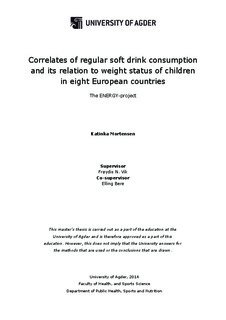| dc.description.abstract | The purpose of this master thesis is to assess the potential direct association between the
assessed correlates and weight status, to assess the consumption of soft drinks as a mediator
of these relationships, of children across Europe and differences between European countries.
The second research question is to assess potential socio-demographic differences and
inequalities between countries, in the determinants and the relationship described above.
Data from the ENERGY project was used. Descriptive analysis and one-way ANOVA were
performed to calculate proportions classified as normal weight and overweigh, according to
gender, ethnicity, parental education and country. Binary logistic regression analyses were
performed with weight status as the dependent variable and correlates as predictors, adjusting
for gender, socio-economic status (SES) and ethnicity, and performed separately for all
countries, gender, SES and ethnicity.
Four correlates were significant; attitude, parent modeling, preference/liking and home
availability. The child’s own soft drink consumption did not mediate the four observed
relationships between correlates and weight status. Parental educational level is associated
with children’s the correlate health beliefs and preference/liking. Between countries,
correlates such as parental subjective norm and home availability were significant in several
countries. Socio-demographic differences were found in Greece and Slovenia, with boys
being less likely to be overweight than girls adjusted for SES and ethnicity.
Attitude, parent modeling, preference/liking and home availability were statistical
significantly related to weight status, and these relationships were not mediated by soft drink
consumption. We found socio-demographic differences and inequalities between countries, in
the correlates, and the relationship described above.
Keywords: Correlates, children, soft drink, weight status | nb_NO |
